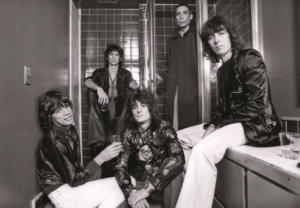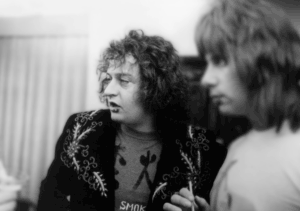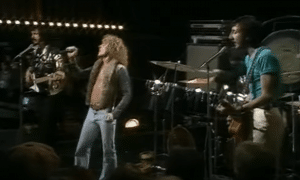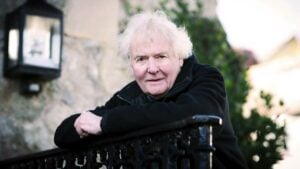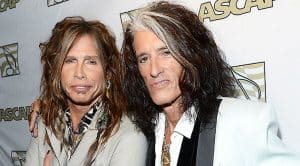The Movies Inspired By The Beatles

via CBC News / YouTube
Long after their last studio album, The Beatles continue to leave a deep imprint not only on music but across many forms of creative expression. While their melodies and lyrics still echo through headphones and vinyl grooves, it’s the spirit behind those songs—the whimsy, rebellion, honesty, and occasional surrealism—that has seeped into the work of writers, visual artists, and filmmakers alike.
Cinema, in particular, has shown a long fascination with the band. From loosely inspired storylines and character archetypes to direct references and full-on musical tributes, filmmakers across generations have found ways to weave Beatles energy into their storytelling. Sometimes it’s subtle, other times it’s a full-blown homage, but the influence is unmistakable once you know what to look for.
Whether it’s the kaleidoscopic storytelling, the idealism of youth, or the bittersweet notes of fame and friendship, The Beatles’ cultural legacy continues to be a rich playground for directors and screenwriters. This collection dives into the movies that drew from that legacy—some overtly, others with a quiet nod—and explores how the magic of four lads from Liverpool lives on in film.
10. Birth of the Beatles (1979)
Birth of the Beatles takes a straightforward biopic route, offering a dramatized chronicle of the band’s formative years. The film zooms in on their pre-fame struggles, the countless hours in Hamburg clubs, and the tensions that led to lineup changes—including the controversial dismissal of original drummer Pete Best. With John Lennon still alive at the time of its release, the film holds a strange place in Beatles cinema history as a depiction unfolding while the legacy was still evolving.
Although not a blockbuster, the movie earned attention for its attempts to stick closely to the band’s early timeline. It explores the lesser-known corners of the Beatles’ backstory, including the tragic death of bassist Stu Sutcliffe, which had a profound effect on the group, especially Lennon. The gritty realism and raw moments give fans a sense of what shaped the early sound and chemistry of the Fab Four.
However, the film isn’t without its flaws. Despite its earnest tone, critics and fans have pointed out the lack of deeper emotional insight or cinematic flair. Still, as one of the first attempts to tell the Beatles’ origin story on screen, Birth of the Beatles remains a foundational viewing experience for anyone wanting a glimpse into the chaos before Beatlemania.
9. Beatlemania (1981)
If there’s one Beatles-inspired movie that lives in infamy, it’s Beatlemania. Designed to recreate the energy of the Broadway musical of the same name, the film instead falls flat for many viewers and critics. Rather than telling a compelling story, it leans heavily on impersonation and stagey recreations of Beatles performances—something that doesn’t always translate well to the big screen.
Critic Jonathan Rosenbaum didn’t mince words, famously calling it his “idea of hell.” It’s a harsh but telling reaction. The film’s lack of narrative depth and emotional resonance makes it feel more like a tribute concert than a true cinematic experience. For audiences expecting a deeper look into the band’s world or even a compelling fictional tale inspired by their influence, Beatlemania leaves much to be desired.
Still, it’s an example of how powerful the Beatles’ cultural presence was—and still is. The fact that such a film was greenlit at all says something about the appetite for anything remotely related to the Fab Four. Even in its shortcomings, Beatlemania is part of the bigger Beatles-on-film tapestry, showing both how easily their magic can be lost in translation and how enduring their draw remains.
8. Backbeat (1994)
Backbeat shifts the focus to one of the most overlooked chapters in Beatles lore—the intense, complicated friendship between John Lennon and bassist Stu Sutcliffe. Set during their Hamburg days, the film doesn’t try to be a full biopic. Instead, it hones in on the emotional and creative push-and-pull of two young artists on the cusp of something massive, but with diverging paths.
The film was stylish and moody, featuring a strong performance by Stephen Dorff as Sutcliffe and Ian Hart as Lennon. It earned praise for its raw energy and unpolished edge, capturing the grit and chaos of early 60s rock and roll. But its reception within the Beatles’ inner circle was lukewarm at best—George Harrison reportedly walked out of a screening after just a few minutes, and Paul McCartney showed little interest in the project.
Despite that, Backbeat remains one of the more ambitious Beatles-inspired films. It explores themes of loyalty, artistic identity, and the heavy cost of fame—echoes of which would ripple throughout the band’s later years. For viewers interested in the human drama behind the music, Backbeat is a fascinating, if somewhat unofficial, companion to the band’s story.
7. The Hours and Times (1991)
One of the more intimate and speculative entries in Beatles-inspired cinema, The Hours and Times imagines what might have happened during John Lennon’s 1963 trip to Barcelona with manager Brian Epstein. Written and directed by Christopher Munch, the film takes creative liberties, blending fact and fiction to explore the complex nature of their relationship.
The film runs just over an hour but is packed with nuance. It doesn’t aim for sensationalism or grand revelations. Instead, it paints a quiet portrait of two men navigating fame, loneliness, and possible unspoken feelings. With restrained performances and minimalist storytelling, The Hours and Times offers a refreshing contrast to the often chaotic and dramatized Beatles lore.
Though fictionalized, it earned critical acclaim and festival awards for its bravery in treading delicate territory. It’s a film less about the Beatles as icons and more about the people behind the fame. In doing so, it adds a layer of humanity to Lennon’s legacy, sparking conversations about identity, vulnerability, and the boundaries between personal and professional life.
https://www.youtube.com/watch?v=5_dgKHVIHeo
6. Two of Us (2000)
Airing on VH1 in 2000, Two of Us is a speculative “what if” film that imagines a fictional meeting between Paul McCartney and John Lennon in 1976—six years after the Beatles disbanded. Directed by Michael Lindsay-Hogg, who had directed the Beatles’ Let It Be film, this low-key drama focuses on conversation over spectacle.
The film centers on what the two legends might have discussed—old wounds, nostalgia, music, and the weight of their legacy. It unfolds in a New York apartment, with understated performances that strive to capture the emotional complexity of the Beatles’ post-breakup dynamic. While it doesn’t rely on flashbacks or big musical moments, it offers something arguably rarer: vulnerability and reflection.
What makes Two of Us resonate with some viewers is its gentle approach. It doesn’t claim to present facts, but instead creates space for imagining reconciliation and healing. In a world still mourning Lennon’s loss, the film serves as a bittersweet tribute to the bond that, despite everything, never truly vanished.
5. Nowhere Boy (2009)
Nowhere Boy steps back to a time before the Beatles existed as a band and focuses solely on John Lennon’s tumultuous teenage years. Directed by Sam Taylor-Johnson, the film portrays a boy caught between two maternal figures—his strict Aunt Mimi and his emotionally volatile mother, Julia. These early relationships would heavily shape Lennon’s music and worldview.
The film doesn’t glamorize Lennon’s youth. It shows the sharp edges of his personality, his rebellious nature, and the pain that drove him. The performances—particularly from Aaron Taylor-Johnson as John and Kristin Scott Thomas as Aunt Mimi—anchor the film with emotional depth. There’s no Beatlemania here, just a troubled kid with a guitar and a growing sense that music might be his only way out.
By the time Lennon meets Paul McCartney in the final act, there’s already a feeling of destiny. Nowhere Boy doesn’t attempt to tell the Beatles story—it ends just as it’s about to begin. But it offers a powerful reminder that before the myth, there was a teenager with heartache, questions, and ambition. And that’s where the real story starts.
4. I Wanna Hold Your Hand (1978)
Set during the Beatles’ legendary 1964 debut on The Ed Sullivan Show, I Wanna Hold Your Hand doesn’t feature the band directly but captures the chaos and mania surrounding their arrival in America. Directed by Robert Zemeckis in his feature debut, the film focuses on a group of fans in New York desperate to meet their heroes, sneak into their hotel, or just get a glimpse of them in person. It’s a fan-centered story that turns Beatlemania into a full-blown cinematic adventure.
What makes the film stand out is its energy—it mirrors the pulse of the era with fast-paced scenes, slapstick comedy, and over-the-top hijinks. Though fictionalized, it reflects real emotions: the giddy obsession, the cultural moment of the British Invasion, and how one television appearance could electrify a generation. It’s less about the Beatles themselves and more about the people who were forever changed by them.
Over time, I Wanna Hold Your Hand has earned a cult following. It’s considered one of the better Beatles-inspired films thanks to its heart, humor, and its ability to channel the frenzy of February 1964 without over-explaining or romanticizing it. For anyone who wants to understand what the early days of Beatlemania felt like on the ground, this film captures that thrill with affection.
3. The Rutles: All You Need Is Cash (1978)
Parody and tribute roll into one with The Rutles: All You Need Is Cash, a mockumentary created by Monty Python’s Eric Idle along with musician Neil Innes. The film cleverly satirizes the Beatles’ rise and legacy through a fictional band called The Rutles, whose journey mirrors that of the Fab Four, down to the hairstyles and album covers. It’s razor-sharp, witty, and packed with references only true fans will fully appreciate.
What makes The Rutles remarkable is its ability to poke fun without malice. Yes, it tears into the mythology, the merchandising, and the media circus, but it does so with an undeniable love for the Beatles’ music and influence. Even the songs—parodies of Beatles tracks performed by the fictional band—are impressively well-crafted, sometimes sounding uncannily close to the originals.
The Beatles themselves acknowledged the film’s brilliance, with George Harrison even appearing in a cameo. That blessing gave The Rutles cultural weight beyond typical satire. It’s both a roast and a toast, celebrating the absurdity and brilliance of Beatles history while holding up a mirror to the frenzy they created.
2. All This and World War II (1976)
Easily one of the strangest entries in Beatles-inspired cinema, All This and World War II is more collage than narrative film. It blends archival footage of World War II—Hitler speeches, marching soldiers, air raids—with covers of Beatles songs sung by various contemporary artists like Elton John, Tina Turner, and Peter Gabriel. There’s no story per se, just a surreal juxtaposition of music and history that defies traditional explanation.
The idea is bold, and for some, completely baffling. Critics and fans alike have debated whether it’s a visual poem, an accidental parody, or just a beautiful mess. While it was panned upon release, it has since gained a certain cult admiration for its sheer audacity. Described as “brilliantly reckless” and “a triumph of bad taste,” the film challenges viewers to question the limits of artistic fusion and intent.
It’s not a Beatles movie in the conventional sense—they don’t appear in it, and their voices aren’t heard. Yet their music becomes the strange glue holding the whole experiment together. For all its flaws, All This and World War II remains one of the boldest examples of how Beatles music can be reimagined in unexpected, if bewildering, ways.
1. Sgt. Pepper’s Lonely Hearts Club Band (1978)
Topping the list not for greatness but for notoriety, Sgt. Pepper’s Lonely Hearts Club Band is the cinematic misfire that tried to capitalize on the Beatles’ iconic album by turning it into a fantasy musical. With the Bee Gees as the titular band, Peter Frampton as Billy Shears, and cameos from Aerosmith and Earth, Wind & Fire, the film had everything—except the spirit of the original music.
The film took the themes and tracks of Sgt. Pepper and attempted to build a story around them, with psychedelic sets and paper-thin characters. What emerged was an overproduced, confusing, and often cringe-inducing spectacle that left Beatles fans scratching their heads. The lack of dialogue (most of the film is sung) and the cartoonish tone only added to the disconnection from what made the album a masterpiece.
Yet in its own way, Sgt. Pepper’s Lonely Hearts Club Band has become a cautionary tale. It shows that while Beatles music may inspire countless artists, it can’t be forced into a formula that doesn’t respect its essence. The film may be worth watching only as a pop culture curiosity—but more often, it’s mentioned as a warning about what happens when ambition outpaces understanding.
















